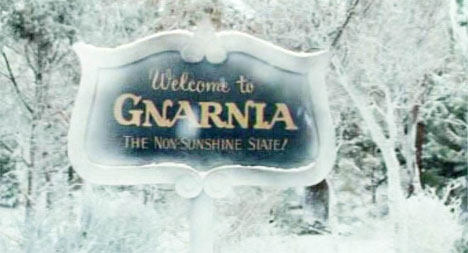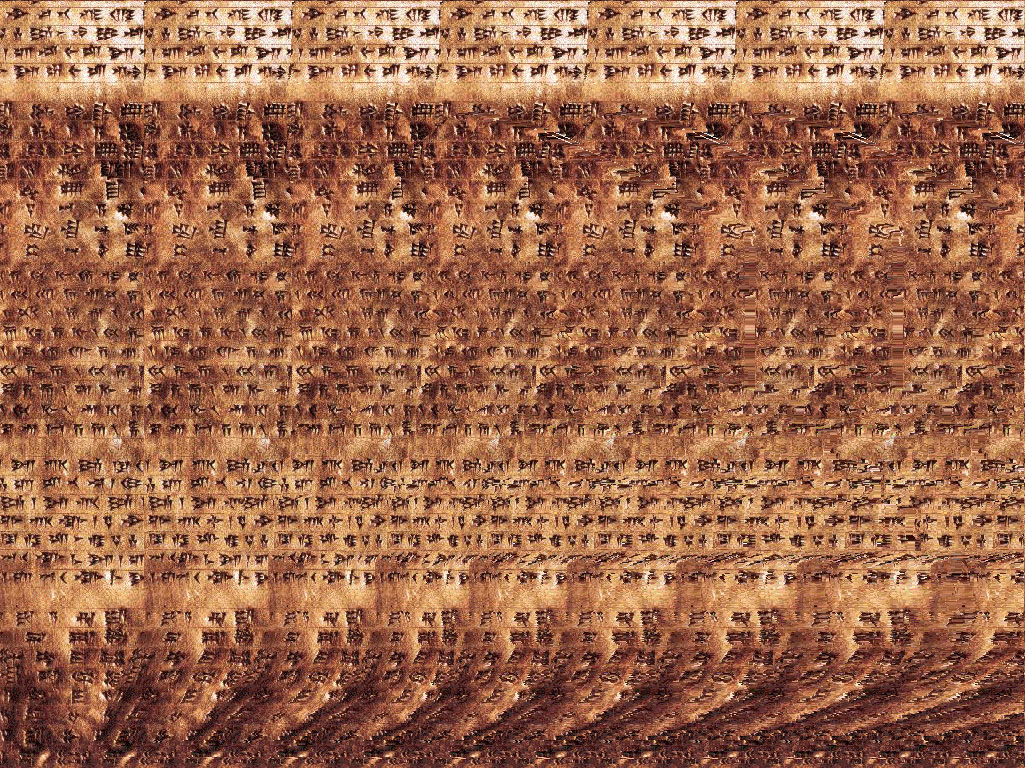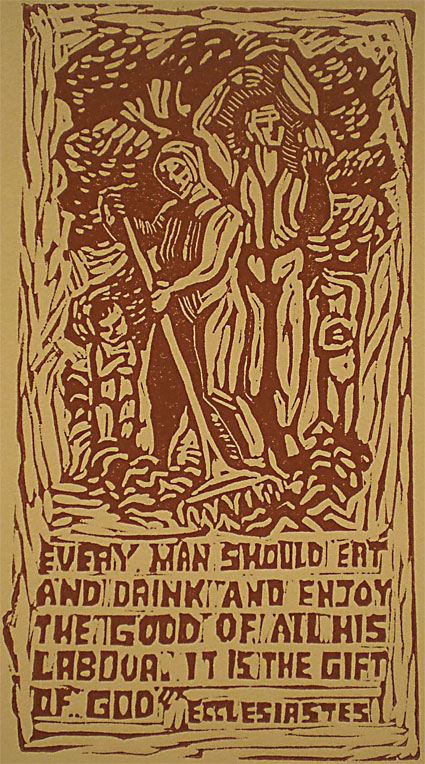Mar
16
2011
or Reading Between the Lines

Many, or most, evangelicals, assume that God is into spoonfeeding us. They think that if a biblical type is not explicitly referred to in the text, then it is risky business. Many evangelicals are brilliant thinkers, but most are not lateral thinkers when it comes to literature. Or at least, they are too cautious to think laterally when analysing the Bible, and only read “the letter of the law.” They, and their congregations, miss out on 50% of the Scriptures — all the parts written between the lines. The funniest part is that this is exactly the element that makes many children’s books, and the most delicious adult dramas, so entertaining. What a bunch of bores. They are like the naive Australians in a Noel Coward play who took every word of the sophisticated Brits at face value. The Bible is far more sophisticated than any other book on your shelf. It is indeed a crafty beast.
Continue reading
13 comments | tags: Genesis, Hermeneutics, James Jordan, Luke, Satan, Typology | posted in Biblical Theology
Nov
15
2010

“Screw the truth into men’s minds.” – Richard Baxter
Doug Wilson, (in an interview a while back concerning Collision, I think), spoke about “copiousness.” It is the Christian’s practice of picking up striking thoughts and illustrations from reading, and from life, for future use. He advocates keeping a Commonplace book to jot things down.
“Keep a commonplace book. Write down any notable phrases that occur to you, or that you have come across. If it is one that you have found in another writer, and it is striking, then quote it, as the fellow said, or modify it to make it yours. If Chandler said that a guy had a cleft chin you could hide a marble in, that should come in useful sometime. If Wodehouse said somebody had an accent you could turn handsprings on, then he might have been talking about Jennifer Nettles of Sugarland. Tinker with stuff. Get your fingerprints on it.” [1]
He describes an incident that makes this book (or blog or mental practice) sound more like keeping caches of ammunition near at hand. Continue reading
2 comments | tags: Chesterton, Doug Wilson, Ecclesiastes, Hermeneutics, Revelation, Spurgeon, Tabernacles | posted in Apologetics, Biblical Theology, Christian Life, Quotes
Nov
8
2010

From James Jordan, The Framework Hypothesis: A Gnostic Heresy, Biblical Horizons No. 107
…I submit that the entire Christian faith stands or falls on how Genesis 1 is interpreted, and that the guardians of the Church must take an unequivocal stance on this matter.
The issue is hermeneutics and religion. Since these “contradictions” in Genesis 1 serve to indicate that this passage is not to be taken historically, the only alternative is to take the passage as giving some kind of archetype for creation by God. It is a foundational “myth,” expressing in “human language” matters that cannot be expressed any other way. It is a true myth in that the ideas taught in Genesis 1 are true.
And this is where the shift from true religion to gnosticism comes in. History has been replaced by ideas. Continue reading
3 comments | tags: Add new tag, Exodus, Genesis, Gnosticism, Hermeneutics, James Jordan | posted in Apologetics, Creation, Quotes
Oct
26
2010

“When you read the Bible, be careful of adopting a bunch of mechanical rules to read by… You know, you can go to the Christian bookstore, or the seminary bookstore, and you can get books by popular writers and by professors of theology on how to read the Bible: ‘rules for reading.’ And there is much that is useful and good in some or all of those books. But we must ask ourselves, what other book have you ever read using rules? Do you have a book of rules to read the newspaper by? Or if you want to read a novel by Jane Austen, must you consult a book of interpretive laws? Or a textbook on American history? Or do you just read it? It’s kind of odd that we have covered the Bible up with ‘rules on how to read.’ We don’t read anything else by rules. So what’s going on here? Continue reading
Comments Off | tags: Hermeneutics, James Jordan, Science | posted in Bible Matrix, Biblical Theology, Quotes
Oct
13
2010
or Yahweh’s Autostereogram

Some readers of Bible Matrix get it straight away. Some get it after a while. Some will never get it. I was thinking it’s a bit like those “autostereograms” that were really popular a few years ago. I was one of the people who stared and stared and stared for years and couldn’t see the 3D images. When I finally did see one, it was a medium-to-large brontosaurus. How did I miss that?
Identifying the Bible Matrix is the same. You have to look at the text cross-eyed. If there is enough of a correspondence, your literary mind will align the two structures. The text of the Bible is architecture. It is a temple built row by row. This is not eisegesis. It is simply a definition of exegesis you hadn’t previously been aware of. It is systematic typology.
Reader Dan Isadore wrote me: Continue reading
2 comments | tags: Genesis, Hermeneutics, Lamech, Literary Structure, Systematic typology | posted in Bible Matrix, Biblical Theology
Aug
28
2010
or Preterism is not a Dirty Word
 .
.
One thing that has struck me since becoming a preterist is how much evangelicals play down the badness of the baddies in the New Testament, i.e. the unbelieving Jews and Christian Judaisers.
Evangelicals would never believe that Jesus and the apostles were mistaken in their warnings of an imminent judgment (and let’s face it, this imminence is a facet of the New Testament that is inescapable). So the only other option they see as viable is a position that defies logic: an event that was near, at the doors, yet could happen at any time over next few millennia.
Continue reading
4 comments | tags: antichrist, Evangelicalism, Hermeneutics, John, Peter Leithart, Preterism | posted in Biblical Theology, The Last Days
Aug
11
2010
The Art of Interpretation

Oh, the depth of the riches and wisdom and knowledge of God! How unsearchable are his judgments and how inscrutable his ways! (Romans 11:33)
Hermeneutics is a big word you learn at Bible College. It is the study or practice of interpreting texts in the areas of literature, law and religion.
In literature, discovering the intent of an author can be an enlightening game. In law, one’s life (or life sentence) can hang in the balance of a judge’s interpretation. In religion, besides plumbing the depths of the mind of God, it is an enlightening game in the balance of which many lives hang. God has revealed His mind in His Word, and has also seen fit to give to His people the often difficult job of interpreting it.
[This post has been refined and included in Sweet Counsel: Essays to Brighten the Eyes.]
Continue reading
Comments Off | tags: Ezekiel, Hermeneutics, John, Literary Structure, Revelation, Timothy, Typology, Warren Gage | posted in Biblical Theology
Jun
7
2010
or The Real Hebel

James Jordan was asked whereabouts in the Bible is the best place to start reading it:
We should start in Genesis. What we should really do is pass a law that for five years you may only read Genesis through Joshua over and over again. So you get the foundation… When the Psalms and Ecclesiastes were written, they were written for people who were steeped in the earlier Scriptures. Ecclesiastes is not some mysterious book of philosophy. Ecclesiastes is all about the Feast of Tabernacles. The Feast of Tabernacles is literally the Feast of “Clouds.” That’s what sukkoth means. You get branches down out of a tree to make a little lean-to. Those branches up on that tree are a cloud. When you make a tree-house down here out of those branches, you’ve got your own little cloud. After a week it disintegrates. But God in His cloud, in His Tabernacle, goes on and on.
Continue reading
5 comments | tags: Ecclesiastes, Feasts, Hermeneutics, James Jordan, Solomon, Tabernacles | posted in Biblical Theology, Christian Life, Quotes
Mar
9
2010

or Understanding Apostolic Wine Science
Scholars talk about identifying the “apostolic hermeneutic,” which sounds intimidating. The reason for this phrase is that according to the commonsense rules of interpretation, the apostles are merrily delinquent. They quote many Old Testament texts, rip them out of their historical contexts and claim they are fulfilled in Christ.
Our problem is that the apostles are neither hacks nor mystics. They are authoritative. Some rightly explain that the apostles are just seeing Christ prefigured in the Old Testament Scriptures, which they are, but this explanation is too vague. God’s Word is meticulous.
Continue reading
Comments Off | tags: C. S. Lewis, Hermeneutics, Literary Structure | posted in Biblical Theology
Dec
8
2009

I say then, has God cast away His people? Certainly not! For I also am an Israelite, of the seed of Abraham, of the tribe of Benjamin. God has not cast away His people whom He foreknew. Or do you not know what the Scripture says of Elijah, how he pleads with God against Israel, saying, ”LORD, they have killed Your prophets and torn down Your altars, and I alone am left, and they seek my life”? But what does the divine response say to him? “I have reserved for Myself seven thousand men who have not bowed the knee to Baal.” Even so then, at this present time there is a remnant according to the election of grace. Romans 11:1-6
Romans 11 is one of those watershed passages. How one interprets it depends on one’s “plan of the ages” paradigm. If you haven’t read James Jordan’s The Future of Israel Re-examined, you need to. Due to its ramifications for interpretation of much of the New Testament, I believe it should be recognised as one of the most important writings of our time. It puts Romans, and especially chapters 9-11, fairly and squarely within a first century context. All would be fulfilled before AD70. God would make “a short work” in the Land. And He did.
It also helps with the interpretation of Revelation. Christ was a new Moses, just as Elijah was. He ascended and gave a double portion of His Spirit to the church as Elisha. The new body witnessed to Gentiles to provoke the hard-hearted Jews to jealousy. This has nothing to do with our day. It was a process confined to the end of the Old Covenant.
Continue reading
Comments Off | tags: Balaam, Hermeneutics, Herod, James Jordan, Jezebel, Paul, Romans | posted in The Last Days



































